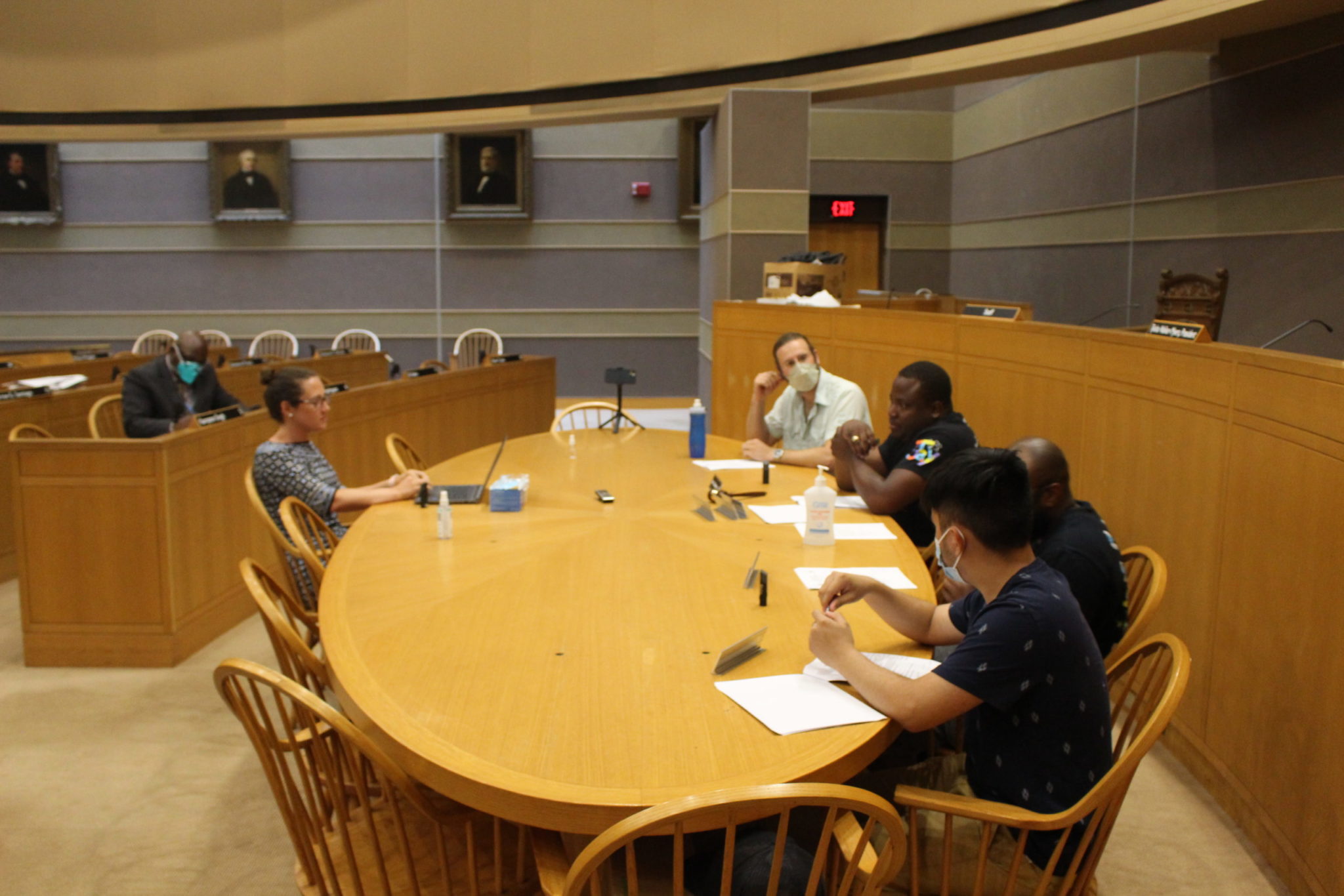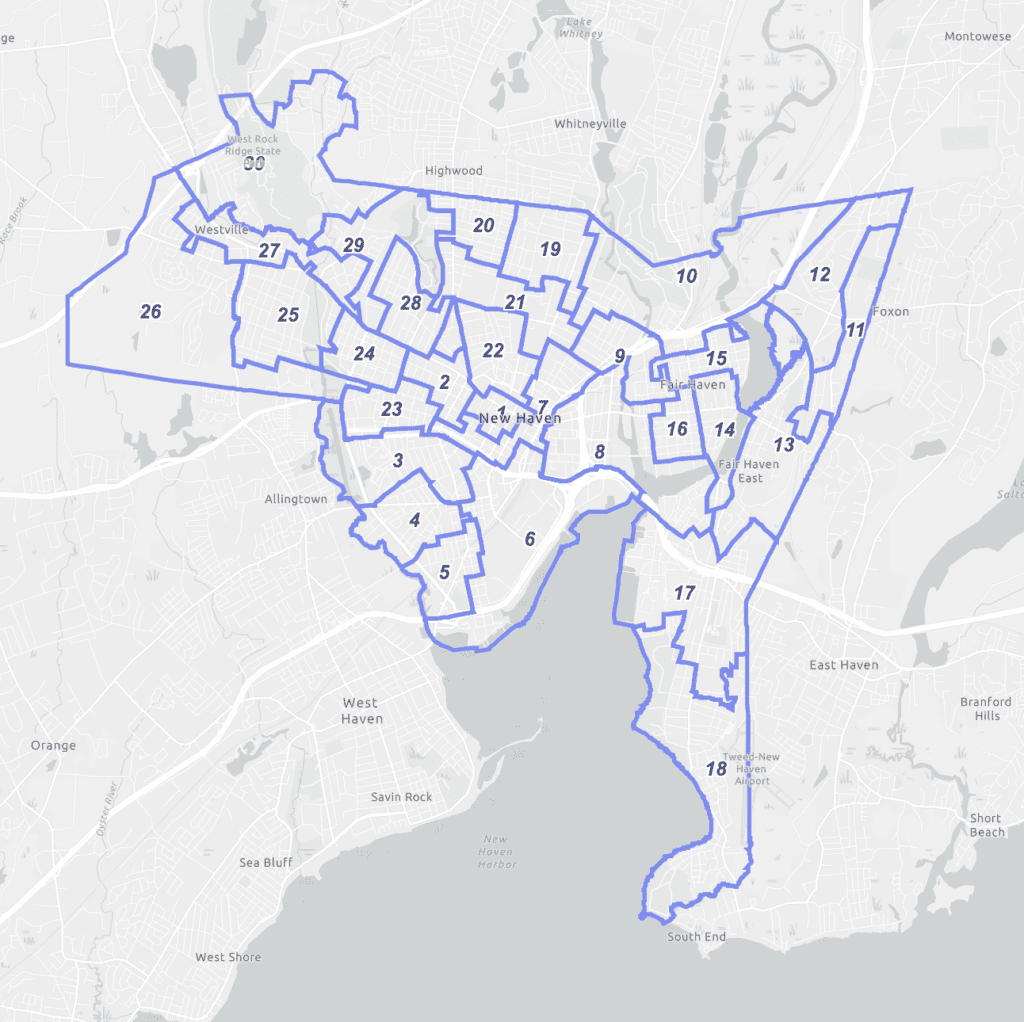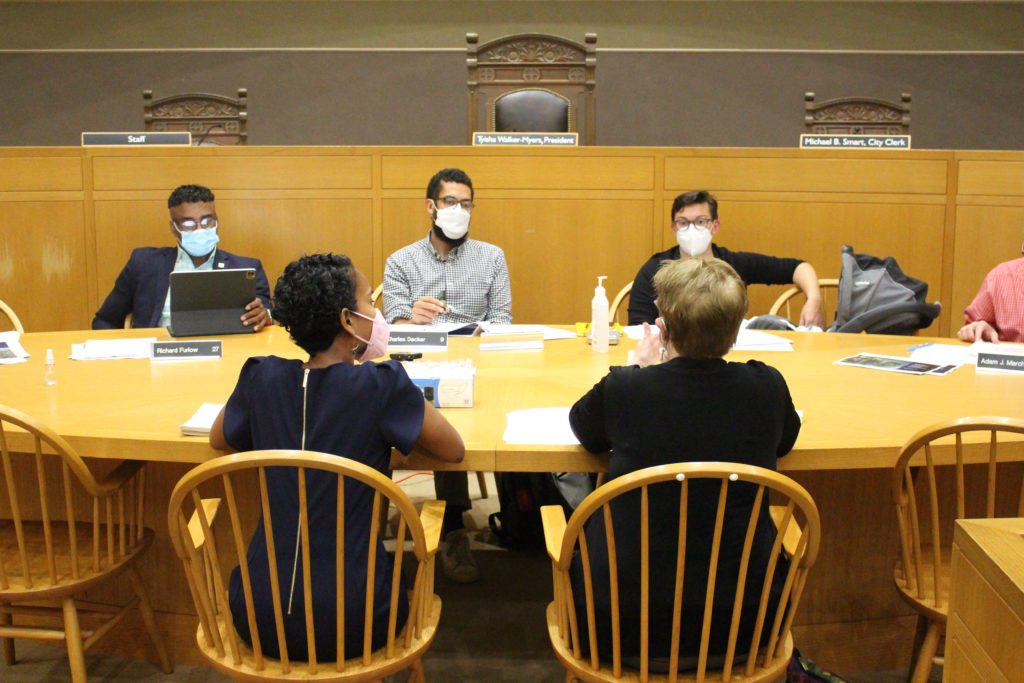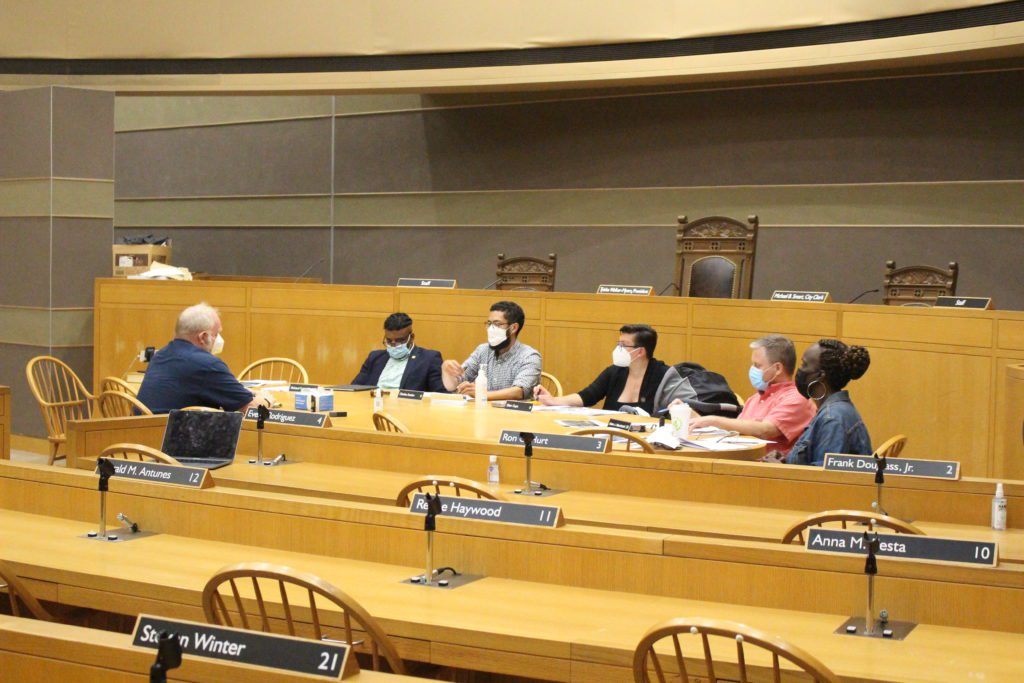Here’s what you need to know about the Board of Alders, New Haven’s legislative council
New Haven’s 30 Alders pass its budget, writes its laws, and holds city officials to account.

Yash Roy, Contributing Photographer
Six months ago, New Haven Mayor Justin Elicker nominated Renee Dominguez to be the city’s police chief. The Board of Alders resoundingly shot down her nomination, setting up a bitter court dispute over power-sharing between the mayor and his co-equal branch.
On Monday morning, Elicker announced $200 million in climate resiliency funds for the city. Eight hours later, the city’s Board of Alders — its legislative council — retroactively approved his ability to announce the funding.
New Haven’s municipal legislative process is said to have been the blueprint for the modern day federal legislative process. In fact, it was chartered 150 years before the United States Congress was founded.
In one of their bimonthly meetings on Monday night, the Board of Alders met to discuss moratoriums on city construction, climate investment and disability-inclusive language.
An Alder may be a title from a time long past, but today, in New Haven, a set of 30 elected Alders help determine the city, Yale’s and New Haveners’ future.
For new and old Yalies, this is what you need to know about your city’s system of government.
What is the Board of Alders?
New Haven has a mayor-council form of government where Mayor Justin Elicker is the chief executive of the city, but he must cooperate on almost all budget and personnel issues with the city’s legislative council called the New Haven Board of Alders.
“Think of the President of the United States and Congress,” Al Lucas, director of legislative staff for the Board of Alders, told the News. “Actually, Connecticut is the Constitution state. Cities like New Haven were the forebears of the congressional system we have today.”
Alders create, pass and amend New Haven laws as well as review and approve the city’s annual budget. They vote on all major appointments to city staff and ensure that the city budget and ordinances are adhered to by city officials.
“Alders are integral to the functioning of the city,” Elicker told the News. “They amend and create city ordinances to improve public safety, transportation, make housing more important while also approving my candidates for city jobs. Without a strong relationship between the alders and mayors, the city could not function.”
How many alders does New Haven have?

The Board of Alders has 30 geographic districts which represent roughly 130,000 New Haven residents. Each of the 30 districts represents close to 4,500 residents with redistricting occurring every 10 years in conjunction with the federal census.
Who are you represented by?
Yale students who live on Old Campus or in one of the eight original residential colleges are represented by Ward 1 Alder Alex Guzhnay ’24. Ward 1’s representative has traditionally been called the Yale Alder because they represent the oldest part of the University’s campus in New Haven.
Guzhnay is the sixth Yale student to serve as Ward 1 alder, according to Sabin, with a Yalie representing the seat for the last 40 years.
Yale students who live in Timothy Dwight, Silliman, Stiles, Morse, Pauli Murray and Benjamin Franklin Colleges are represented by Ward 22 Alder Jeanette Morrison, while students who live in Rosenfeld Hall are represented by Ward 7 Alder Eli Sabin ’22.

How does a proposal become law in New Haven?
Just like Congress, almost all legislation is initially referred to the President of the Board of Alders, Tyisha Walker-Myers, who then assigns it to one of the 10 aldermanic committees.
This committee will then hold a hearing on the bill, called the bill’s first reading. During the first reading, alders on the committee can amend the legislation, ask city officials to testify on the feasibility of the bill and invite members of the public to also testify on the bill’s necessity.
Once the committee votes on the legislation, it goes to the full Board of Alders for a second reading and final vote. If passed, the mayor can approve or veto the legislation.

The 10 standing committees include the Aldermanic Affairs Committee, the City Services and Environmental Policy Committee, the Community Development Committee, the Education Committee, the Finance Committee, the Health and Human Services Committee, the Legislation Committee, the Public Safety Committee, the Tax Abatement Committee and the Youth & Youth Services Committee.
Anyone can propose legislation. According to Ward 14 Alder Sarah Miller, a large portion of the actionable items alders vote on originates with New Haven residents. Residents can direct ideas or legislative text to either their alder or the Director of Legislative Services Al Lucas.
What are New Haven’s biggest priorities right now?
The city currently has a five pronged legislative agenda that was unanimously approved in March 2021: jobs for New Haven residents, a safe city for everyone, quality affordable housing, health equity and vibrant communities and environmental justice.
“My two biggest priorities have been and continue to be housing and transportation,” Sabin told the News. “We’re trying to make New Haven more affordable. More and more students are living off campus, and we’re trying to make sure that there’s more housing and more affordable housing getting built.”
In January, the Board of Alders passed an inclusive housing ordinance for the city’s center that requires any new housing in the central city to include affordable housing for people that make 50 percent of the median income of the area, according to Sabin.
According to Guzhnay, the city has also added new bicycle routes downtown including on Wall Street. He hopes to make New Haven’s streets safer for pedestrians and bicyclists.
“Yale students can provide a lot of helpful information on things like safer streets and bike paths,” Guzhnay told the News. “But, at the end of the day Yale can support its students so a lot of my work is supporting non-affiliated constituents and also giving more opportunities to people who frequent downtown to work, eat or go out.”
Sabin and Guzhnay also both spoke of deepening the university’s relationship with New Haven. They both acknowledged that the university had increased its contributions to the city, but pointed to the wide disparity between the support system Yale has for its students while many New Haveners do not have the support or help they need.
During their most recent meeting, the alders approved an amendment to the New Haven Code of Ordinances that would update city law with language that is more respectful and inclusive of people with disabilities.
The new “person-forward” language will change references throughout the code from “handicapped person” to “person with a disability,” and remove all language around “mental retardation.”
Budget woes
Each year, the Board of Alders passes a budget for the next fiscal year. According to Lucas, city departments first determine their fiscal needs. Then, the Mayor presents a budget to the Board of Alders in February.
The Board of Alders and Finance Committee mark up the bill — running through the text of the bill line by line making edits — as well as hold two public hearings for New Haveners to testify on the budget. The budget is then traditionally passed in May.
Yale’s role in the city has historically been a problem during the annual budget season.
In 2021, New Haven was on the precipice of fiscal collapse. Haunted by the specter of unsustainable pension payments and a drop in tax revenue due to the COVID-19 pandemic, Elicker made the unprecedented move of unveiling two budgets. The first was a crisis budget with a 7.25 percent increase in property taxes, millions in cuts through layoffs and the shuttering of city buildings. The second a more optimistic budget that banked on an increase in state and Yale funding.
By the end of the 2021 budget negotiations, the city was able to pass a budget that did not make severe cuts but relied upon a $51 million increase in funding from the state and Yale.
The city’s bet paid off with New Haven State Senator and Senate Pro Tempore Martin Looney shepherded through a bill redistributing funding from the Payment in Lieu of Taxes, or PILOT, program which more than doubled the state’s contribution to the city from $41 million to $91 million.
The state provides a large chunk of funding through PILOT since Yale takes up more than half of the city’s property without paying taxes to the city. Yale instead pays taxes to the state which then distributes the money to cities like New Haven where large portions of the property tax base cannot be accessed.
Moreover, in 2021 after years of New Haveners advocating for Yale to provide more funding to the city, Yale increased its voluntary contribution by $10 million.
Combined, these two funding sources have now alleviated most budgetary concerns in the city according to Elicker.

How to get involved
The Board of Alders meets at 7 p.m. on the first and third Monday of every month in the Aldermanic Chambers in City Hall, on 165 Church St. During the summer, they meet only on the first Monday of the month.
Residents — including students — are encouraged to attend and raise suggestions, questions or concerns.
“Yale students should be good neighbors to try to contribute and be part of the community,” Sabin said. “Respect the city and community that will be your home for at least the next four years.”
Elicker invited students to attend Aldermanic meetings and to apply for the city commission if they will be in New Haven during the summer. However, he cautioned students to not sign up for city responsibilities for the novelty, but only if they can truly commit to serving the city.
Yalies can also work through the Presidential service fellowship to work as an intern in the Board of Alder’s office, city departments or for an Alder, according to Lucas.
“Get out of the Yale Bubble,” Guzhnay advised his fellow students. “Yale has at times helped craft a problematic narrative that the city is dangerous, but go out of downtown to explore all of our beautiful communities. That will help you better give back to the city.”
Specific committee meetings are outlined on the City of New Haven’s website.







